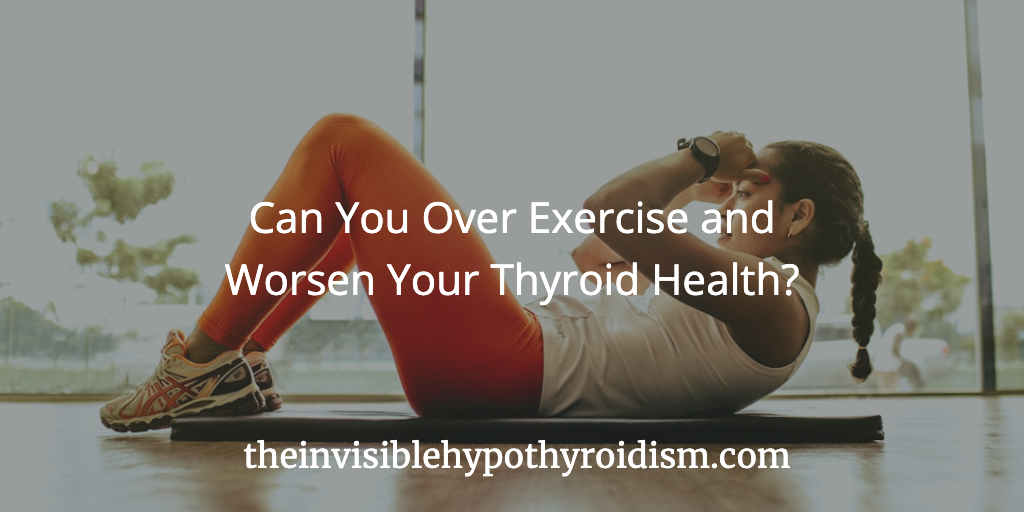Originally published on 18th March 2017 Last updated on 10th June 2024
Whilst regular exercise is clearly beneficial and in fact crucial for good health, there is such a thing as over exercising.
Could you be pushing your body too far and causing more harm than good?
Do you ever feel flarey, dizzy or lightheaded with exercise? Or as if you have poor stamina or poor ability to withstand much exercise? Do your arms ever feel like dead weights after exercising? Or do you experience frequent shin splints when you attempt exercise?
These are common complaints from those with hypothyroidism.
Related Post: 5 Do’s and Dont’s for Exercising With Hypothyroidism and Hashimoto’s
Exercise and Hypothyroidism: A Caution
Care should be taken with physical activity when you live with endocrine issues such as thyroid disease or adrenal dysfunction (though it is more accurately referred to as hypothalamic-pituitary axis dysfunction), as exercising incorrectly for your body can exacerbate these conditions and actually cause you to feel worse.
The thyroid gland regulates the body’s metabolism and impacts every cell and function in the body. When it doesn’t work properly, e.g. underperforms, this causes hypothyroidism, a slowing down of many bodily processes.
However, repeatedly engaging in overly demanding exercise can cause a surge of biochemical imbalances to occur within the body, including the disruption of the hypothalamus-pituitary axis, which can reduce thyroid function. For example, intense cardio, marathon running and training, intense weight lifting etc. with little to no recovery time can all cause extreme stress to the body, particularly the thyroid. (please note: these are just examples)
But does this mean we shouldn’t do them at all? Keep reading to find out!
Too Much Stress On The Body Isn’t Good
When the body is under stress – emotional stress, mental stress, as well as physical stress – it responds by producing cortisol, a stress hormone produced by the adrenal glands.
Cortisol will always be produced when we exercise, this is a very normal thing! But what we need to be aware of is if exercise is causing too much to be produced, due to our body feeling very stressed. To know this, we have to pay attention to our body following exercise.
Many of us with hypothyroidism already have stressed-out adrenal glands, due to the stress of having (often undiagnosed or under-treated) hypothyroidism, even without knowing. This means that we could have high cortisol levels all day long, where our body is in a constant stressed-out mode, and producing more cortisol by over exercising may add to this. I experienced this firsthand and it made exercising very hard.
When too much cortisol is produced, as can happen when we overexert ourselves, it can inhibit thyroid function and cause adrenal dysfunction, where, even if our thyroid test results look OK, we still feel unwell, with on-going issues and symptoms.
You can check your cortisol levels with a 24 hour, four point saliva test to confirm. If your doctor won’t check your adrenals, you can very simply order testing yourself here and here.
Signs of Stressed Out Adrenal Glands
A sign of adrenal issues may include trying to exercise, only to find you crash, feeling light-headed and faint. This is due to cortisol being part of the glucocorticoid family, a substance that raises your glucose level. It is cortisol’s job to give you the energy you need.
I have read in several books, including Dr Skinner’s, that they are unsurprised by marathon runners who eventually get struck down with endocrine issues such as thyroid and adrenal dysfunction, due to the intense and unneeded stress this puts on the body.
Listen To Your Body
Although there are benefits to higher intensity training, such as improving overall health and building lean muscle, without maintaining a good balance of exercising, resting and recuperating, along with proper nutrition, setbacks in our health and symptoms can plague us.
You may think you are following a perfectly healthy workout routine, when in reality you could actually be causing some serious damage to your body or hindering your journey back to good health with thyroid disease.
Listening to our bodies is crucial and taking things at our own pace will help us to avoid over exercising or doing the wrong kind for our bodies and causing more thyroid flares and ongoing symptoms. After all, we want to live well with thyroid disease and feel healthy and full of life!
However, it is obviously crucial to mention here that every person (and every thyroid patient) will be different. We will all have different needs when it comes to exercise, from type of exercise to frequency and intensity. You may well need to experiment with different types and frequencies to see what does and does not work for your body.
As thyroid conditions affect people on a scale, no two experiences are the same and no two bodies will be able to handle the exact same exercise routine.
However, many thyroid patients do find that their ability to tolerate exercise, and a range of exercise too, improves with time, as their thyroid condition become more well-managed and medication is fine-tuned. and then many other people continue to exercise as they did before a thyroid disease diagnosis and are doing well.
Signs that you need to take things slower and reevaluate your exercise regimen include:
- Mood swings
- Fatigue that is also long-lasting
- Thyroid flares following exercise
- Loss of muscle
- Blood sugar dips after working out
- Feeling intense muscle weakness and shakiness after working out
- Disrupted sleep
- Mental health conditions such as anxiety and depression
- Brain fog or cognitive issues
- Feeling worse after working out instead of energised
Adding to that, you can also explore the full list of adrenal symptoms here.
Which Exercise Works Well?
Activities that tend to be popular among thyroid patients include: yoga, pilates, swimming, walking and even dancing. Anything that can be done at your own pace is a big plus and if you can add a social aspect into it too – perhaps getting friends to support you – even better! Read about how to find the best exercise for your body here.
The time of day can also impact when you exercise. If you find that your blood sugar levels are affected or you have cortisol issues (many of us feel at our worst in the morning), you may find it better to exercise later on in the day, such as at lunchtime or in the afternoon.
After a thyroid disease diagnosis, you may need to rediscover which exercises you can safely do without taking your health backwards.
Has your exercise been affected with a thyroid diagnosis?

The book Be Your Own Thyroid Advocate: When You’re Sick and Tired of Being Sick and Tired, which builds on this post and covers how Rachel’s got her thyroid condition under control and became the leading thyroid patient advocate!





